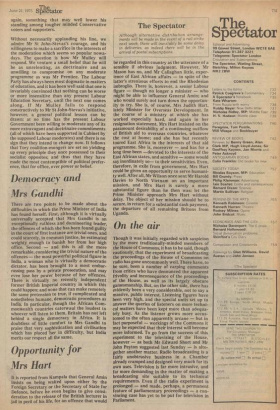On the air
Though it was initially regarded with suspicion by the more traditionally-minded members of the House of Commons, it has to be said, though cautiously, that the experiment of broadcasting the proceedings of the House of Commons on radio has gone uncommonly well. There have, to be sure, been a number of carping comments from critics who have denounced the apparent frivolity and inconsequence of the proceedings of the House, as well as its largely obscure gamesmanship. But, on the other side, there has evidently been a very considerable, not to say a massive, public interest. Listening figures have been very high, and the special units set up to answer the queries of listeners on more technical matters have been kept more than adequately busy. As the listener grows more accustomed to the often apparently arcane — but in fact purposeful — workings of the Commons it may be expected that their interest will become more informed. To go from the success of this experiment to the televising of the House, however — as both Mr Edward Short and Mr John Peyton suggested last Sunday — is altogether another matter. Radio broadcasting is a fairly unobtrusive business in a Chamber already cramped and designed very much for its own uses. Television is far more intrusive, and far more demanding in the matter of making a broadcasting site suitable to its technical requirements. Even if the radio experiment is prolonged — and made, perhaps, a permanent feature of parliamentary proceedings — a convincing ease has yet to be put for television in Parliament.


































 Previous page
Previous page